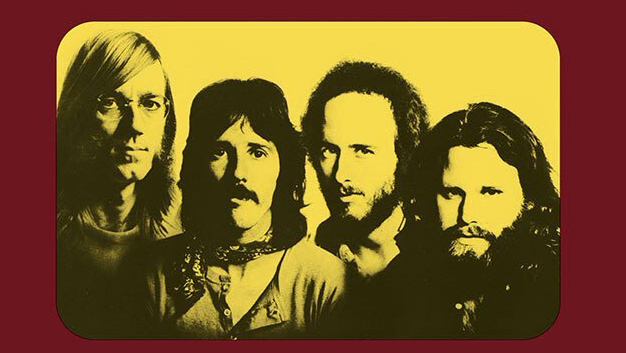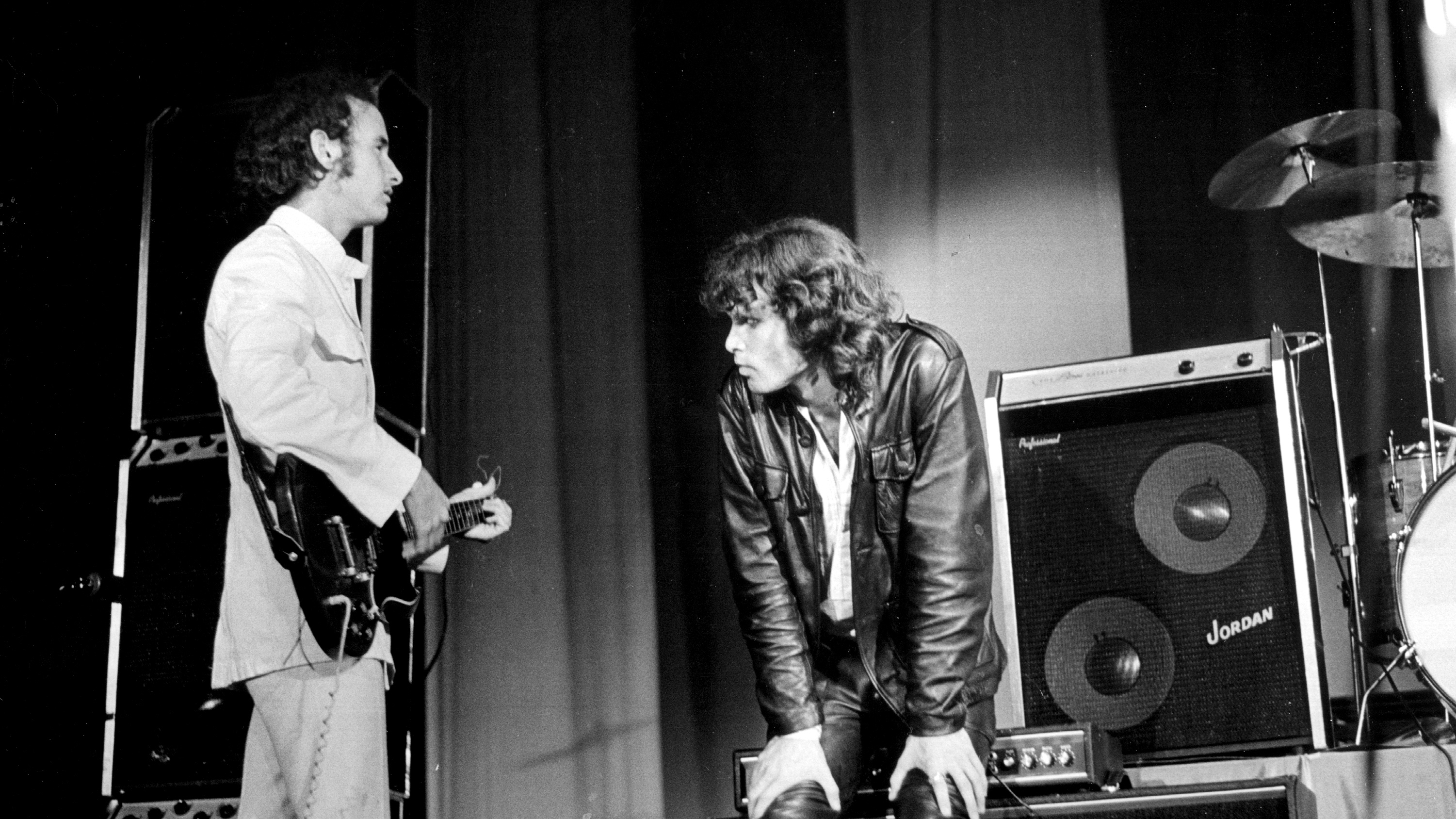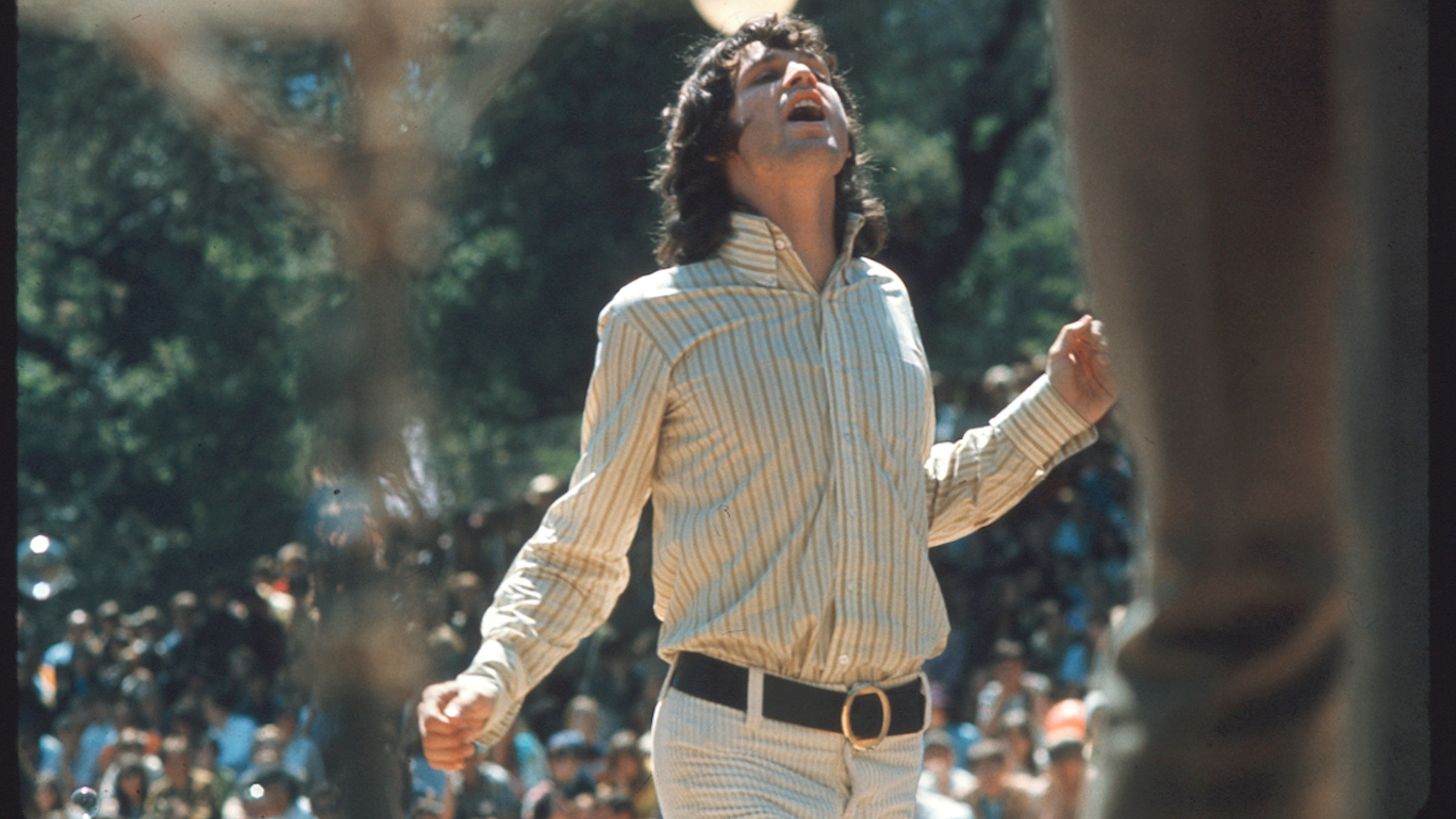"I remember him coughing and spitting up blood, probably from smoking too many cigarettes. But in my mind, Jim was indestructible": Robby Krieger looks back on the making of The Doors' LA Woman

This interview was originally published in 2012 to celebrate the 40th anniversary reissue of LA Woman.
"I'm glad that LA Woman was our last album," says Doors guitarist Robby Krieger. "It really captured what we were all about. The first record did, too, but LA Woman is more loose, it's live - it sounds almost like a rehearsal. It's pure Doors."
Forty years after its release, music fans young and old are reveling in the the sound of "pure Doors" on the just-issued 40th anniversary edition of LA Woman, a two-CD set jammed with alternate versions of classic songs like Love Her Madly and Riders On The Storm, along with the newly discovered cut She Smells So Nice.
Stuff always seemed to be happening to us – it's just the way things were
Recorded in late 1970 and early '71, LA Woman - a superb collection of tough, ballsy blues and ameliorating trippiness - is the product of a band rallying around itself despite serious cracks in the wall. During writing and tracking sessions, singer Jim Morrison's enormous penchant for drink was now out of control, exacerbated by a court case stemming from an incident in which he was accused of exposing himself on stage in Florida.
Adding insult to injury, The Doors' longtime producer, Paul A Rothchild, called the group's new songs "cocktail music" and passed on making the record. Undaunted, the group (which also included keyboardist Ray Manzarek and drummer John Densmore) hunkered down with Elvis Presley's bass player, Jerry Scheff, and guitarist Mark Benno and co-produced what would be their swan song with their longtime engineer, Bruce Botnick. This turbulent period is recounted in vivid detail in the new Blu-ray and DVD release called The Doors - Mr. Mojo Risin': The Story Of LA Woman.
"It was a stressful time," says Krieger, "but we had a lot of fun making the record. Stuff always seemed to be happening to us – it's just the way things were. But anytime we played, all felt good."
Krieger isn't spending all of his time on memory lane, however: recently, he, Manzarek and Densmore collaborated with au courant DJ/producer Skrillex (Sonny Moore) for the song Breakin' A Sweat. Their generation-spanning recording session is part of the new documentary film RE:GENERATION, in which four other eclectic pairs work together to create new music.
Get the MusicRadar Newsletter
Want all the hottest music and gear news, reviews, deals, features and more, direct to your inbox? Sign up here.
MusicRadar sat down with Robby Krieger to talk about LA Woman, Skrillex and the guitarist's upcoming participation on the next installment of the Experience Hendrix Tour. Regarding the latter, we asked Krieger the eternal question: Ever meet Hendrix?
On LA Woman, a real sense of liberation comes through. Is that how you were all feeling, to be finally producing yourselves?
"It was, definitely. All of our other records were produced by Paul Rothchild, who was a great producer, but he was a bit… meticulous. LA Woman felt like we were making a demo. We were in a rehearsal place, we weren't in some $100-an-hour studio, and we knew the sound we wanted to hear. It felt like we were coming home, in a way. The whole thing was great."
Maybe Paul didn't want to be known as the 'dead man's producer'
When Paul Rothchild said he didn't want to produce the album, did his criticism sting?
"It did, it did. We were pretty up about the music we were making. We had rehearsed for a couple of weeks before we played some things for Paul. He came down to the studio and listened one day - and you know, maybe we weren't at our best; it's hard to say [laughs]… but he just wasn't into it.
"I hate to think this, but Paul had just come off a big hit record. He had done Pearl with Janis Joplin. Maybe he was saying to himself, 'The Doors are on their way down. I don't want to get caught in this thing.' And Janis had just died, too – he might have been looking at Jim and thinking, Man, he's under the gun with this trial. Who knows what's going to happen?... I don't know. Maybe Paul didn't want to be known as the 'dead man's producer.'"
The alternate versions are very live sounding.
"They sure are. Most of our stuff was cut live, with a minimum amount of overdubbing. You can feel that. On the song LA Woman, Jim was singing right along as we were playing. He loved to sing in the bathroom because it had a nice echo - but he could look out and see us. Yeah, it was live."
These versions definitely give one a sense of how the band would have sounded playing the songs on stage.
"Only we would've sounded better. If we would've played every night, two or three weeks into it, just think about where it could have gone from there."
Were The Doors thinking of touring behind the album? There were some problems with the band playing live.
"We would have toured. Of course. We had already played a couple of shows. What happened after Miami, there was a meeting of what was called the Halls Managers Association, and they kind of blackballed us from playing any of the big places. We couldn't play for a while there. But after eight months, or maybe it was a year, a couple of the halls finally did let us play. We did a show in Texas and one in New Orleans - that was the last show we ever did together…"
I thought he'd be drinking a fifth of whiskey a day until he was 90 years old. Guess I misjudged that
Most of the songs on LA Woman were tracked with additional musicians. Would you have toured as a five- or even a six-piece?
"Very possible. Some of the songs didn't have a bass player. But we used bass players on all of our albums. We never toured with one, except for one or two gigs here and there. But it would've been fun, man, to play with Jerry Scheff and Mark Benno."
How was the band viewed at this point? Were a lot of your early, pop-oriented fans disenchanted by the music you were making?
"I think the earlier fans were more disenchanted when we did The Soft Parade, the way we used the horns and strings. I think a lot of them didn't like that. Instead of The Doors, it sounded like Jim Morrison with an orchestra. [laughs] But we did have hits - Touch Me and stuff like that. When Morrison Hotel came around with Roadhouse Blues, I think a lot of our old fans were back on board with us."
How was Jim doing physically during the making of the record?
"He was definitely a little rough. The whole trial thing was hanging over his head and all that. He wasn't feeling too well health-wise. I remember him coughing and spitting up blood, probably from smoking too many cigarettes. But in my mind, Jim was indestructible. I thought he'd be drinking a fifth of whiskey a day until he was 90 years old. Guess I misjudged that…"

I never thought this was going to be his last album
When he went to France, was the general idea that he'd go chill out for a while?
"Yeah. We were happy for him, too. We thought, God, he needs that. Maybe he'll come back and he'll be fine, you know? I never thought this was going to be his last album."
Had Jim lived, where do you think the band would have gone musically post-LA Woman?
"I'm thinking, with Riders On The Storm and that jazzy kind of sound, we could've gone that way, or it could've gone more blues. Jim was really getting into the blues. In one of our songs, he sings, 'I'm an old blues king.' [laughs] I think he liked that image. Blues and jazz - both of which are part of our roots anyway."
In the early '70s, bands like Yes and ELP were getting big - progressive rock with very long, complex arrangements.
"Yeah, right. Well, you never know, we might have done that, too. We had that song The Celebration Of The Lizard, which was almost a suite. We could've gone that way."
John was always at odds with Jim
People don't often talk about John Densmore's drumming, but he's amazing throughout LA Woman. He's got such a unique swing to his playing.
"He sure does."
How was he feeling about the band then? He was vocal about his displeasure with Jim…
"John was always at odds with Jim. A lot of times he was on the verge of quitting. But he always liked playing the music with us. I think it was a two-edge sword with him. Through it all, he was definitely the drummer for The Doors. Nobody could have done the things that he did musically."
What was the band listening at the time? And what type of stuff did Jim like?
"Blues. Jim was really into the blues. Muddy Waters, John Lee Hooker… I'm trying to think of what else. Jim liked all kinds of music.
"You know, I heard this thing on the radio, I don't know what it was... It was something on one of the FM stations, and it was that little thing I did on Texas Radio - 'da-daa-dupp!' - I kind of stole it from that song. Maybe if the guy who wrote that song calls me, I'll give him some money." [laughs]
How did you work out your guitar parts with Mark Benno?
"Basically, we wanted somebody to play the rhythm parts so I could concentrate on the leads without overdubbing them - I would just play them as we were recording. It worked out pretty well. Mark knew what he was supposed to do. I thought he did a great job."
How did the song LA Woman come about?
"That's a good question. [thinks, hums the song] Probably Ray started playing on the A chord, and then I came in with my guitar parts. At first, Jerry started copying Ray's left hand, but that didn't work, so he came up with a cool thing."
More of a rolling bassline...
"Yeah. And he was with Elvis Presley at the time, so the part he played reminds me of Burning Love. On some of the songs, when Jim didn't know what to sing, he would look in his poetry books and get ideas from that. This time, he came up with that stuff about LA and an 'LA woman.' I don't know where it all came from - it just popped out of his head."
Crawling King Snake recalls Love Me Two Times. It's slower, but your main guitar figure is almost identical.
"Yep, you're right. [laughs] We always used to listen to John Lee Hooker, we all loved his stuff, and on Crawling King Snake there might be Ray playing guitar, too… [thinks] No, no, he was playing the keyboard on that. On one of the other songs, Been Down So Long, I think he played some guitar."
Were you aware that you were quoting yourself on Crawling King Snake?
"Probably not. I probably wouldn't have done it if I would've thought about it. [laughs] It's that one note, that little part - 'derrrung!' - that's one of my favorite little licks."
What guitars did you use on the album? You played an SG Standard on most records, but occasionally there were a few other ones.
"It was pretty much my SG. For slide I used my Les Paul Black Beauty, which I still have. In fact, Gibson's going to be making a copy of that guitar pretty soon."
What kinds of amps did you use?
"For recording, I used Twin Reverbs. In those days, the Twins had JBL speakers, and you could get a really clear sound out of them. If you played really loud, though, they would break up really nice. So you could have the best of both worlds. They were very reliable amps, and I just liked the way they sounded on recordings."
You weren't big on pedal effects in those days, were you?
"Not very much. I had a Maestro Fuzz-Tone, which I used, but other than that… let me think... Oh, I did use a 12-string [a Gibson ES-335] on a couple of songs, like Love Her Madly and Texas Radio."
Shifting to the present, the song you guys did with Skrillex, how did that come about?
"The Grammy people had this idea of putting some electronic guys together with some other types of musicians. They had a guy play with a classical group, they had a guy play with a jazz group, somebody played with blues, and we were the rock one. I wasn't sure how it was all going to work, really.
"Ray and I went down and hung out with Skrillex at this studio, and we came up with a song. Apparently, they put it out in England, and it's number one right now, so I guess people like it."
Did you immediately 'get' where Skrillex is coming from?
"Pretty much. At first, he had some beat he was doing, and I dug it. Ray didn't; he was like, 'What the hell are you doing, man? Try it like this!' [laughs] So Ray started playing something and Skrillex went, 'Oh yeah, that's cool!' He put a beat to that, and then I played an electric sitar, which Skrillex totally fucked up and made it all electronic - you can't even tell it's a sitar. It's cool.
"A lot of Skrillex's sounds could be coming from a guitar, but they could be coming from a keyboard or a controller - it's hard to tell. But it's more organic sounding than most electronic music."
When you were in the studio with him, did you call him 'Skrillex'?
"No, I called him 'Skrilly.'" [laughs] Actually, his name is Sonny, so that's what I called him."
He's pretty young. Did you get the impression that he truly 'got' The Doors?
"Oh yeah, definitely. I think he draws from all sorts of music. He's pretty plugged into what kids like right now – I don't know why. He's just this kid from the Valley who started putting his stuff out on the internet, and it clicked with the kids."
Next month, you're going out on the Experience Hendrix Tour. You've done a couple in the past. Aside from the music and that you get to play a lot of guitar…
"What else do you need?" [laughs]
Exactly. But is there anything else that keeps you coming back?
"Well, it's just cool to hang out with all of those guitar players. And to be part of something that Jimi Hendrix was about is cool, too, because he was one of my heroes."
Jim jammed with Hendrix once
Did you ever meet Hendrix?
"I did meet him - just once, really. It was when we played the Isle of Wight together. He was cool, a really nice guy. My wife's girlfriend was his girlfriend, so I'm sure we would've hung out a lot more if he had lived. I saw him play at the Whiskey once and at the Fillmore, but we never got to jam.
"Jim jammed with Hendrix once. [laughs] It was at the Scene in New York. Jim came in and got totally smashed, started groveling around on the stage, crawling about, and he started singing. Jimi was yelling, 'Sing into the mic, man!' [laughs] He was so fucked up, he couldn't. Pretty crazy."
LA Woman 50th anniversary deluxe edition is available now. More info here
Joe is a freelance journalist who has, over the past few decades, interviewed hundreds of guitarists for Guitar World, Guitar Player, MusicRadar and Classic Rock. He is also a former editor of Guitar World, contributing writer for Guitar Aficionado and VP of A&R for Island Records. He’s an enthusiastic guitarist, but he’s nowhere near the likes of the people he interviews. Surprisingly, his skills are more suited to the drums. If you need a drummer for your Beatles tribute band, look him up.
“I’m beyond excited to introduce the next evolution of the MT15”: PRS announces refresh of tube amp lineup with the all-new Archon Classic and a high-gain power-up for the Mark Tremonti lunchbox head
“These guitars travel around the world and they need to be road ready”: Jackson gives Misha Mansoor’s Juggernaut a new lick of paint, an ebony fingerboard and upgrades to stainless steel frets in signature model refresh





![PRS Archon Classic and Mark Tremonti MT 15 v2: the newly redesigned tube amps offer a host of new features and tones, with the Alter Bridge guitarist's new lunchbox head [right] featuring the Overdrive channel from his MT 100 head, and there's a half-power switch, too.](https://cdn.mos.cms.futurecdn.net/FD37q5pRLCQDhCpT8y94Zi.jpg)





